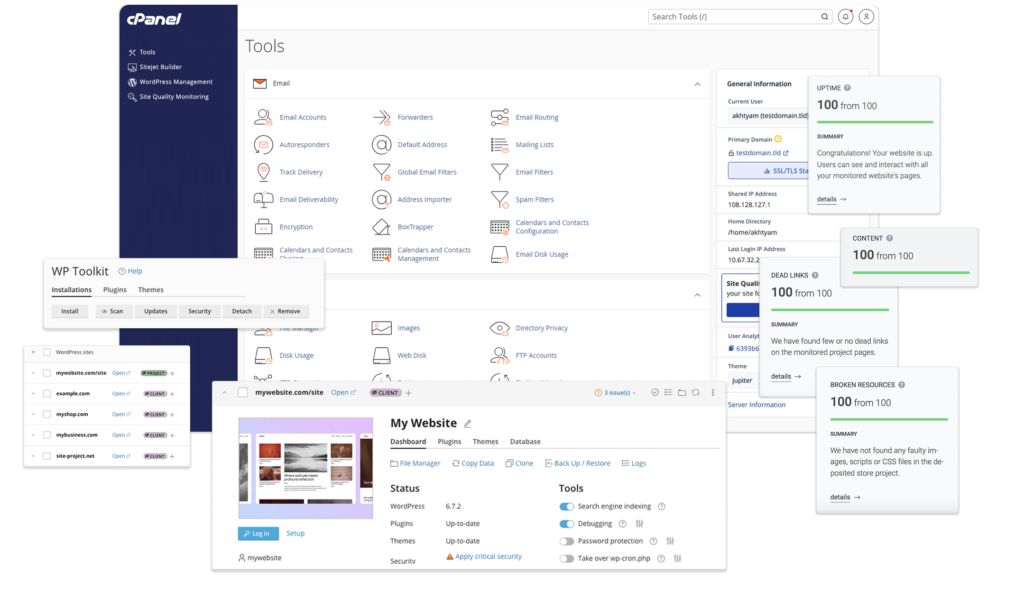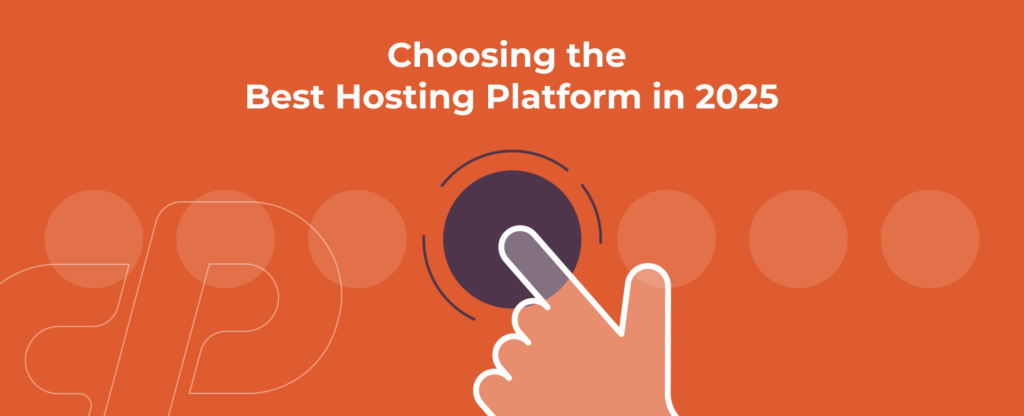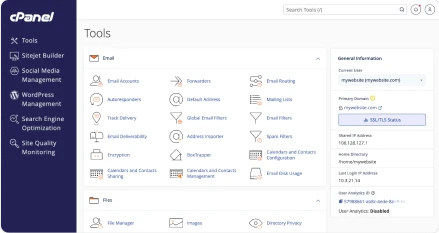So, you’re exploring your web hosting options, be it launching your very first website or considering switching to a new hosting provider.
Unfortunately you’ve discovered the vast range of web hosting platforms out there; it’s no surprise, as the web hosting market has significantly grown year after year, with projected revenue valued at approximately $192.8 billion in 2025.
Choosing a web hosting platform can feel almost overwhelming, with so many different options and plans available. You can find yourself spending hours comparing offers, reading reviews, and combing through terms and conditions. However, there are several key aspects you should keep in mind when choosing a hosting platform, that will help you determine whether it’s the best fit for you.
Factors to Consider When Choosing a Hosting Platform
Although every source may suggest different factors to consider, a general consensus persists that some of the main considerations of a hosting platform are server hardware, bandwidth and storage, security, and customer support. Dive in with us to explore the key role these factors play in choosing a hosting platform, and also discover some more that are, in our experience, just as vital.
1. Hardware
Both the performance and stability of your website are influenced by the server hardware. Make sure your hosting provider uses the latest components, like SSDs, powerful CPUs, and sufficient RAM. Modern servers with up-to-date technology can handle more traffic and provide faster load times, which is vital for both user experience and SEO.
2. Uptime
Server uptime is crucial. Most providers promise 99.9% uptime, meaning they promise operation servers almost all the time. However, you should dig deeper and verify their actual uptime performance, as uptime guarantees sometimes come with exclusions or limitations. High uptime makes sure your website stays online and accessible for your users. Providers like Hostinger and Bluehost are often recognized for their uptime reliability, but this performance can vary depending on factors like location and server load. Checking customer reviews and third-party uptime monitoring reports can offer some of the best insight into their actual performance.
3. Bandwidth and Storage
Modern hosting plans usually offer enough bandwidth and storage for most websites. However, if you run a media-heavy site or manage multiple websites, make sure to carefully review the terms of any ‘unlimited’ plans which usually refer to ‘unmetered’ usage and may come with restrictions, e.g. fair use policies or throttling during periods of high demand. You should always verify the fine print to ensure your specific needs, such as media-heavy content or high traffic, will be fully supported.
4. Shared Web Hosting with cPanel
For many users, shared web hosting with cPanel is an ideal choice. It’s easy to use, budget-friendly, and packed with fantastic features to manage websites, such as one-click app installations, database management, and email configuration. Look for providers that offer reliable shared cPanel web hosting, to simplify your website management.

5. Security Features
Cyber threats are evolving rapidly, making strong security more important than ever. Key features to look for in web hosting include firewalls, intrusion detection and prevention systems (IDS/IPS), and DDoS protection.
SSL certificates are crucial for encrypting data, ensuring the integrity and confidentiality of information exchanged between users and your site. Hosting providers like SiteGround and A2 Hosting are known for offering solid security features such as free SSL certificates, proactive threat detection, and strong DDoS protection.
6. Customer Support
Reliable customer support is crucial for smooth website management. Make sure that your hosting provider offers 24/7 support through options such as live chat, phone, and email. Fast, knowledgeable, and helpful customer service is important for resolving any issues quickly and efficiently.
7. Scalability
Choose a provider that lets you easily upgrade or scale resources as your website grows. This means more disk space, bandwidth, and processing power without causing significant downtime or the need for complex migrations. Providers like Bluehost and Hostwinds offer flexible plans that grow with your business, aim to minimize downtime, and make the process as seamless as possible, especially for their higher-tier plans.
8. Green Hosting
Environmental awareness and sustainability are increasingly important in the hosting industry. Many hosting providers are investing in renewable energy and energy-efficient technologies to reduce their environmental impact. Many providers are making strides in sustainability through renewable energy initiatives.
9. AI-Powered Hosting
Artificial intelligence and machine learning are changing the hosting industry. Many hosting providers are using AI to improve server resources, predict traffic patterns, and improve security. By using predictive analytics, AI helps predict traffic spikes and adjust resources accordingly, which can lead to better performance and reduced risk of downtime.
AI can also play a key role in enhancing security by detecting potential threats in real-time and applying automatic fixes. Additionally, by improving efficiency and reducing manual intervention, AI can help lower costs, making hosting services more cost-effective and reliable.
10. Edge Computing and CDNs
Edge computing and content delivery networks (CDNs) are also becoming more important in the hosting industry. CDNs mainly focus on delivering content like images and videos from the nearest server, making websites load faster and reducing delays. Edge computing brings data processing closer to the user, which helps make things run more smoothly. Companies like Cloudflare and Amazon AWS are leading the way in these technologies.
Specialized Hosting Platforms
Shared vs. Dedicated Hosting
Shared Hosting: In shared hosting, such as cPanel shared web hosting, multiple websites share a single server using resources like CPU, RAM, and disk space. It’s the most affordable option and works best for smaller websites with less traffic. Shared hosting is great for personal blogs, small business sites, and portfolios. Although its affordability is a great advantage, it can have limits on performance and security because of shared resources.
Dedicated Hosting: With dedicated hosting, you rent an entire server just for your website. This gives you full control, better performance, and stronger security, making it perfect for large websites with high traffic. Dedicated hosting is best for e-commerce sites, big businesses, and websites that need high security. The benefits include superior performance and full customization, but it comes at a higher cost.
VPS vs. Bare Metal Hosting
VPS Hosting: A Virtual Private Server (VPS) provides each website with its own virtual environment on a shared server, with an allocated amount of the server’s resources. It’s a good middle ground between cost and performance, ideal for websites that have outgrown shared hosting. VPS hosting offers better performance, scalability, and security compared to shared hosting. It’s great for medium-sized businesses, e-commerce sites, and websites with moderate traffic.
Bare Metal Hosting: Bare metal hosting means you get an entire physical server all to yourself. Unlike shared hosting, you don’t share any resources, like CPU, memory, and storage; everything is dedicated to you. This setup ensures high performance, making bare metal servers perfect for resource-heavy tasks like high-traffic websites, database management, and large-scale enterprise applications. The main advantages are top performance, security, and control, but it requires a higher budget and more technical expertise.
WordPress Hosting
WordPress hosting is designed to work with WordPress websites. It includes features like one-click WordPress installation, automatic updates, and enhanced security tailored for WordPress. Providers like Bluehost, SiteGround, and WP Engine offer specialized WordPress hosting that ensures reliable performance and robust security, with shared cPanel hosting. This type of hosting is perfect for bloggers, small businesses, and anyone using WordPress as their content management system.
Get Started with cPanel Shared Hosting Today
Choosing the right hosting platform is just the first step—now it’s time to get started! If you want an affordable, reliable, and easy-to-use hosting solution, cPanel shared hosting is the way to go. Offered by many hosting providers, its user-friendly control panel, powerful security features, and easy website management mean you can launch and manage your website without any hassle. It’s an excellent choice for small businesses, blogs, and personal websites.
For those who own their own servers or require more control over their hosting environment, buying a cPanel license is the best option. With a cPanel license, you can easily set up and manage your own shared hosting solution, whether you’re a developer, small business, or hosting provider.
By getting a license, you receive access to all of cPanel’s powerful features, allowing you to set up, manage, and monitor multiple websites without any hassle.
Once you have your license, you can customize your shared hosting environment to suit your specific needs. cPanel licenses are easy to purchase, and come with straightforward set-up instructions, ensuring that you can get started quickly. You’ll also have assistance every step of the way with our dedicated support team.
Why Choose cPanel Shared Hosting Licenses?
From our exploration into different hosting providers, it’s clear that cPanel shared hosting is perfect for those searching for a trusted, inexpensive, and user-friendly option for their website. It features:
- Easy Management: Intuitive cPanel interface for easy control of your websites.
- High Performance: Fast servers that load your site quickly and keep downtime to a minimum.
- Affordable Pricing: Cost-effective plans that fit your budget.
- Scalability: Easily upgrade your resources as your website grows.
Don’t wait—get started today!
Check out a free trial of cPanel, or buy your cPanel license directly now and experience hassle-free hosting with top-tier support.

